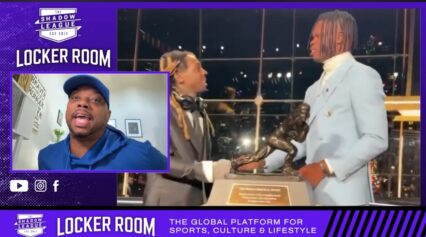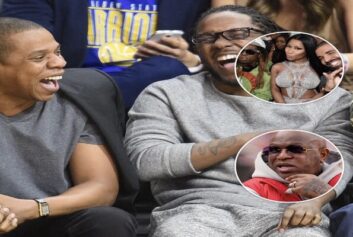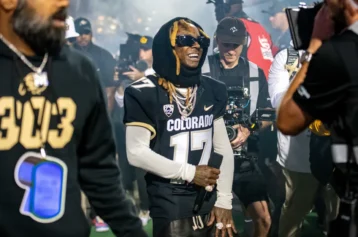Last night, episode two of Season three of “The Chi” aired and it was a pivotal moment in the Black masculinity conversation.
As many characters have left the show, like actor Jason Mitchell who played the former central character, Brandon, new characters have been added.
https://www.youtube.com/watch?v=UXnB_981Btg
Mainly the expanded Jake storyline about the young man who’s older brother Reg was killed and the murder coordinator is now his legal guardian.
Think that is mind-blowing? Well, add to that mix another even older brother who reappears after a prison stint with his love interest to gain custody of Jake.
Through his monologues, we learn that Trig, played by actor Luke James, is a street individual who is reformed and wants to keep his little brother clear of the street life.
Jagged Little Pill
Cue Alanis Morissette’s classic singles, “You Oughta Know” and “Ironic” from her worldwide debut album Jagged Little Pill and you have the gumbo that is The Chi plot lines.
Trig, is a gangster with a heart. He seems weather-beaten from the war perpetually afflicting the ghetto and now is the time for him to reestablish his family.
He drives a Mercedes G Wagon and has a fashionable partner named Imani played by Jasmine Davis. The actress is a Chicago native and in the episode, it is revealed that she is trans after an incident at a gay bar with her heterosexual boyfriend.
The show’s creator and episode three writer, Lena Waithe discussed the scenarios she was infusing in this season.
The 36-year-old actress, writer, and producer said on a June 22nd episode of The Late Late Show with James Corden that Season 3 will be the “gayest season ever” and have a “fantastic” new character named Jasmine.
“We kick off with two black women marrying each other in holy matrimony. I’m so excited that we finally get to introduce our first trans character this season,” she added. “Her name is Jasmine, she’s a Chicago native, she’s fantastic.”
Harpo, who this woman? #TheChi pic.twitter.com/cSt0sVaN3m
— Your Favorite Flower 🌸🌳 (@jashminley) June 29, 2020
The fact that the Imani character’s trans status is understated at the outset sets up the reveal scene brilliantly. Checking her boyfriend in a gay bar for being offended that a gay man hit on him. She makes Trig apologize to the gay man and asks him what pronouns he uses before addressing the character as he/him.
“We make sure to not point a finger or shed too much light on her being trans,” she said. “She’s an amazing woman, she’s an interesting character, and I’m excited that we finally get to do that this season.”
#TheChi I knew her voice was too deep lmao pic.twitter.com/ESk9rbPuqc
— World Wide Ant🫡 (@FirstName_Ant) June 28, 2020
The fact that Trig is even in a gay bar, sets up an assumed bisexual reveal. However, what was not expected was his girlfriend was really trans.
The Last Frontier?
As the world “awakens” to issues they already knew about but are now taking initial actions on social justice, the internal issues within communities of color are shining brighter.
Can poverty, created and sustained by systemic racism, be the only cause for crime in communities of color? This is explored with actress Birgundi Baker’s character Kiesha Williams who goes missing in the episode.
Time out Trig’s girlfriend is a guy?!? #TheChi pic.twitter.com/zdpyGno3IV
— Brian 🏁🏁 (@KingMegatron2) June 29, 2020
Mental health issues are a constant in The Chi which always carries a heavy mood over an otherwise ordinary life people are trying to achieve in fictionalized Chicago.
But the new elephant in the room is homosexuality and the many myths and stereotypes surrounding that community.
From the wedding by two women, that starts the season, to the newfound understanding that Imani is trans, these are not issues discussed as openly as it was presented.
However, the trans community is a force within Black culture. They are targets for hate crimes and racial discrimination while being proud to be Black.
They have felt abandoned by the religious traditionalists within the Black culture which says that their existence is a slight that needs “correcting”.
“I’m gonna get dressed you’re taking me out”
“What’s the occasion”
“Nigga I’m the occasion”
•
•
I felt that sis 💯 #TheChi pic.twitter.com/GY4US6p7U5— … (@aaahsein) June 28, 2020
The National Center for Transgender Equality (NCTE), along with Black Transmen Inc., Black Transwomen, and the National Black Justice Coalition, released a report detailing the experiences of black respondents who participated in the 2015 U.S. Transgender Survey (USTS).
Among the report’s findings, 20 percent of Black transgender respondents were unemployed, twice the rate among Black people in the U.S. population.
38 percent of Black transgender respondents were living in poverty, compared to 24 percent of Black people in the U.S. population.
42 percent of Black transgender respondents have experienced homelessness at some point in their lives, compared to 30 percent in the USTS sample overall, and 22 percent experienced homelessness in the past year because of being transgender.
53 percent of Black respondents have been sexually assaulted at some point in their life, compared to 47 percent in the USTS sample overall.
67 percent of Black respondents said they would feel somewhat or very uncomfortable asking the police for help, compared to 57 percent of respondents in the USTS sample overall.
6.7 percent of Black respondents were living with HIV, nearly five times the rate in the USTS sample overall, and more than twenty times the rate in the U.S. population.
#TheChi had me weak lastnight when bro was arguing with his girl about not being gay but his shorty a whole trans gender 🤯🤯🤯 NIGGA 🗣🗣 YOU ARE GAY ‼️‼️‼️ Talm bout all I see is that you’re a female NOW. 🤦🏾♂️🤦🏾♂️ lmao wtf
— Blade Brown (@ColtsFan1116) June 28, 2020
Those are a lot of stats but it underscores the fact that the Black trans community is not protected.
What does that say about the causes we are currently fighting for as people of color if we exclude a percentage of that population either by intentional annexation or convenient amnesia?
Demystifying Black Masculinity vs. Toxic Masculinity
The first question most men of color, that consider themselves heterosexual, asked themselves was, “how is Trig rationalizing not being gay but being intimate with a trans person?”
Great. Another black show where a black man is either gay or downlow. #TheChi pic.twitter.com/ufPEGD3ptU
— It's Getting Real (@cmoney73) June 28, 2020
That question by itself is reasonable, however, it excludes the fact that there are men of color who see people for who they are. Imani’s character is a woman yet she identifies with places that house LBGTQ culture like gay bars.
Trig accompanies her because he sees himself as separate and unequal to men that cavort with men sexually. It opens up the archaic belief with communities of color that LGBTQ lifestyles denote weakness or “sin” culturally.
It also shines a light on the feminization of the Black male, which, historically through slavery and oppression, has always been a polarizing subject.
Black Bro Science labels everything from cheap Tropical Fantasy sodas to chemical trails in the sky as a catalyst for an LGBTQ “awakening” in the Black community.
The definitive answer to if a person is born gay or chooses is still in limbo in the Black community and when you break it down by age, it gets really emotional.
https://twitter.com/softhomothug/status/1274769543437717507?s=20
Look no further than former NBA great Dwayne Wade and wife Gabrielle Union’s decision to chronicle the journey of their daughter Zaya Wade. The 13-year-old, whose parents recently said she identifies as transgender, has taken criticism from outspoken Black celebrities like Boosie Badazz.
https://www.youtube.com/watch?v=HPo-Yme1YOw
The same Boosie whose toxic masculinity was on full display when he revealed he made his teenage son and nephews have sex with grown women.
Boosie literally describes and defends his decision to allow statutory rape to happen because the males are the underage victims. It echoes a similar reveal by Lil’ Wayne in his documentary The Carter where he revealed that at 11 years old his first sexual experience was with a woman.
He described it as, “I got raped when I was 11; I loved it. I ain’t never press charges. I’m a do you like Baby and them did me. I’ll never forget that day they was all in the kitchen, I was scared. I’ll never forget the words, ‘suck Lil’ Wayne little d*ck.'”
Wayne reveals this while pouring codeine and soda aka mixing syrup and being laughed at by his entourage.
Starting to see the layering of problems?
Toxic Rewards
Rewarding Black males for being toxic is commonplace and just as disgusting as Billy Bush laughing when then-candidate Trump reveals his penchant for grabbing a woman by the p*$$y.
Still, the latter was awarded the Presidency of the United States and excused by Melania Trump as engaging in locker room talk. This is not just a Black culture construct but a masculinity identifier.
However, is the culture of Black masculinity rife with toxic masculinity? Or is this just Lena Waithe’s gay grandstanding to push the culture forward via uncomfortable subject realms?
Take away the religious molding within Black communities from grandmothers and community elders and to me what is revealed is a deeper fear by Black men of being perceived as gay on any level.
The derogatory word “f*ggot” has even been co-opted to denote softness or plain idiocy.
Being seen at a gay bar or a drag brunch is a misnomer and a signal that someone might be in the closet. It doesn’t leave room for straight men existing in gay spaces and maintaining their level of masculinity.
What Lena Waithe did brilliantly was suggesting without defining.
Is Trig gay? Is a trans woman, truly a woman in the construct of Black culture?
These are the very gray zones that Black culture lives in while Black people are victimized on all fronts and even within the culture.
However, the question now is, can we do better?



